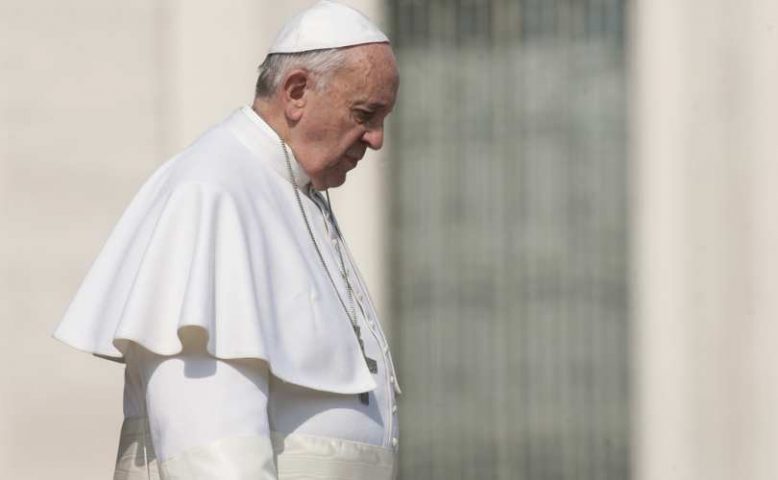Illinois Bishop Decrees: No Communion and No Funeral Rites for Same-Sex Couples
June 24, 2017Big Win for Religious Freedom in Circuit Court Case on Gay Marriage
June 24, 2017
Photo: giulio napolitano / Shutterstock.com
Why doesn’t the Pope respond to the Dubia? The former director of the Vatican Bank thinks he knows why. In a biting essay in Italy’s La Verità, translated below, Ettore Gotti Tedeschi suggests that Francis is sending two messages through his silence: that he can contradict himself if he likes and that he wishes to impose a “New Catholic Morality” on the Church. This new morality would be based not on doctrine but on the subjective opinions of the individual conscience. Meanwhile, Amoris Laetitia’s denial of eternal damnation contradicts Jesus’ assertions in the Gospel that sinners are indeed in danger of this fate. Ultimately, Francis’ silence — which allows doubts to continue to flourish — is a denial of objective truth.
By Ettore Gotti Tedeschi, June 23, 2017 (LifeSiteNews) — I see two implicit messages in the Pope’s failure to answer the dubia. The first implicit message is “I can contradict myself if I want to.” At the start of the Synod on the Family (October 2014), the Pope invited the cardinals to speak openly and frankly, without fear of embarrassing the Pope (the famous parresia). And yet for months the Pope has refused to respond privately or publicly to the dubia expressed by four cardinals who represent a large part of the faithful.
The second implicit message seems to be a declaration of the intent to impose a “New Catholic Morality.” This would be founded on the awkward circumstances of the new ethical demands (or requirements) of new situations created by the secularized world, not on the Commandments, the Catechism and the Magisterium invoked by the “obsolete” Veritatis Splendor.
In the past, the Church’s concern was to keep the faithful “strong in the Truth” in order to conserve the faith. She therefore discouraged a disposition to interpret doctrine and the magisterium in a subjective and dangerously misleading manner. Indeed, back then the task of pastors was to confirm the certainties of faith by “teaching,” not just by “listening.”
Today, it could be said that you should have subjective and unresolved doubts to demonstrate that you have an “authentic faith.” You must not try to resolve them or seek answers to questions on points of ambiguous interpretation because that would be insolent and arrogant. Doubts are necessary because it seems that we don’t want to affirm a single, absolute and objective truth. A pluralist and dialectical truth has taken its place because this latter truth, a truth based on the conclusions of a “self-taught” individual conscience, has replaced doctrine as the judge of actions (praxis).
One might say that traditional morality has been overridden by circumstances (and not the ideal), and since we should not longer judge (that is, objectively evaluate circumstances), the Church seems to want to renounce the possession of the truth and its teaching (unless it concerns the environment, poverty and immigration). Thus, a failure to respond to the dubia confirms that doctrine is abstract and that it is of no use to salvation because truth is transitory, subjective and open to differing interpretations. It is better to dialogue, then, than to teach something that is no longer eternal.
For months, theologians have been forced, or have been obliged, to highlight only a few parts of Amoris Laetitia, neglecting the parts that leave doubts and generate subjective interpretations. This means that AL does not seem to be as “objective” as some assume. But the controversial points aren’t so marginal, minor or irrelevant to the many good parts. I suggest that readers read for themselves the articles in question (AL 297, 299, 301, 305, 329 … ) and ask themselves the questions posed by the four cardinals and Catholics who refer to the Catechism, the Gospel and the specific Magisterium (Casti Connubi, Veritatis Splendor, Familiaris Consortio … ). The dubia are concerned with what is a grave (mortal) sin here: the possibility of the reception of sacramental absolution and the Holy Eucharist by those who live illegitimately as husband and wife and don’t want to stop. The dubia ask what marital chastity is and if situations exist in which we must sin because there are temptations greater than our strength. They ask if situations exist in which a form of ignorance justifies sin.
Dear readers, the dubia ask if a new morality is or is not being proposed and if the help of God, which never fails, aims to keep us from sinning or to keep us from feeling guilt after having sinned. The dubia are not a bizarre and spiteful showing off by four cardinals.
Beware! In the Gospels, Jesus says 15 times that there is a risk of eternal damnation if someone persists in a grave sin, while Amoris Laetitia 297 claims that no one can be condemned forever because it is not the logic of the Gospel. Thus, eternal damnation would seem to have become a heresy. However, AL 304 says also that the general norms in its formulations cannot embrace all particular situations, implicitly admitting the existence of so many doubts left to subjective and dangerous interpretation.
The Pope’s failure to answer the dubia would illustrate that doubts must be resolved subjectively because Truth is no longer objective. Thus, the Church today seems to be declaring that she does not want to have a doctrine to propose to the world. She believes that circumstance determines doctrine, rather than the contrary. Therefore, the new Church seems to want to give moral suggestions but without precepts, without laws. It is useless to ask if this is so.
Translated by Dorothy Cummings McLean with permission from La Verità







